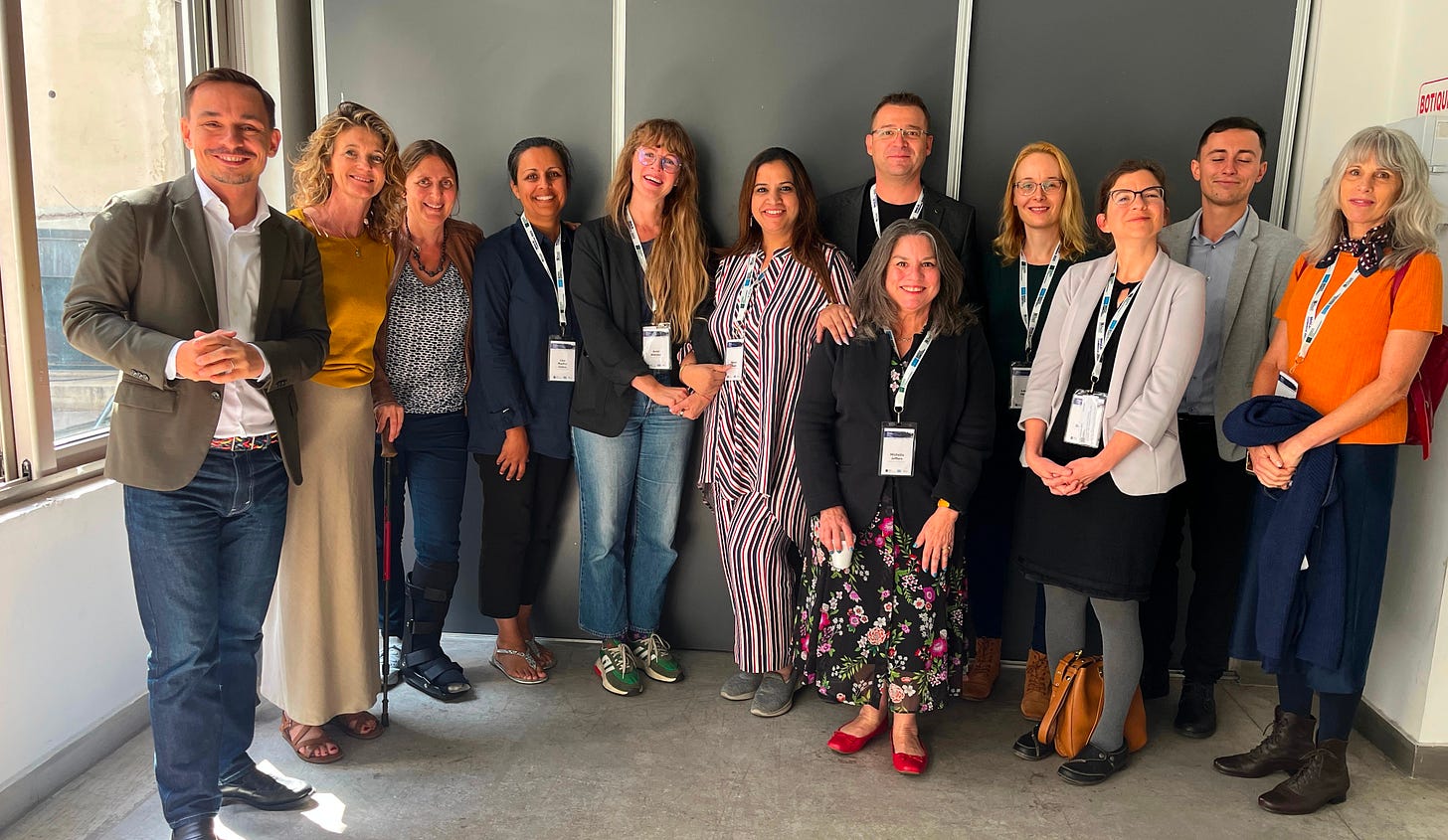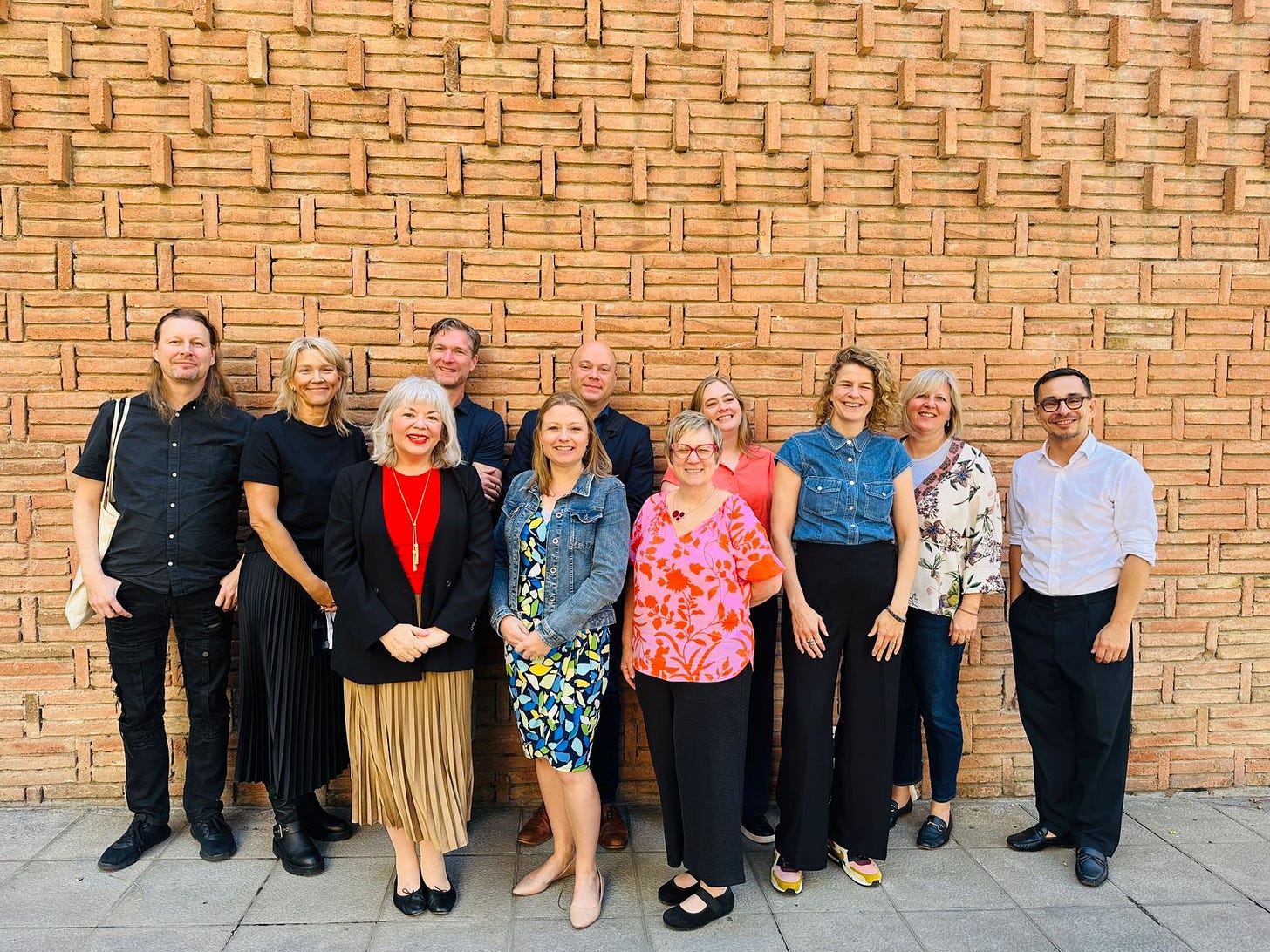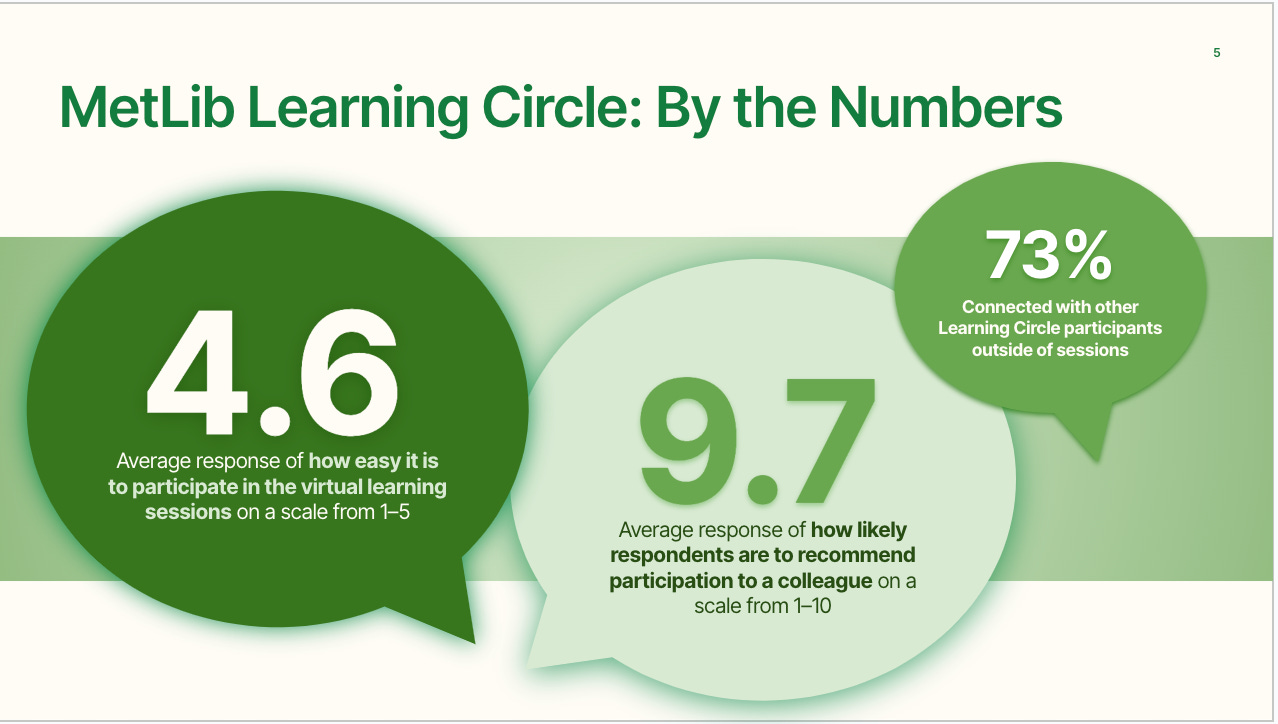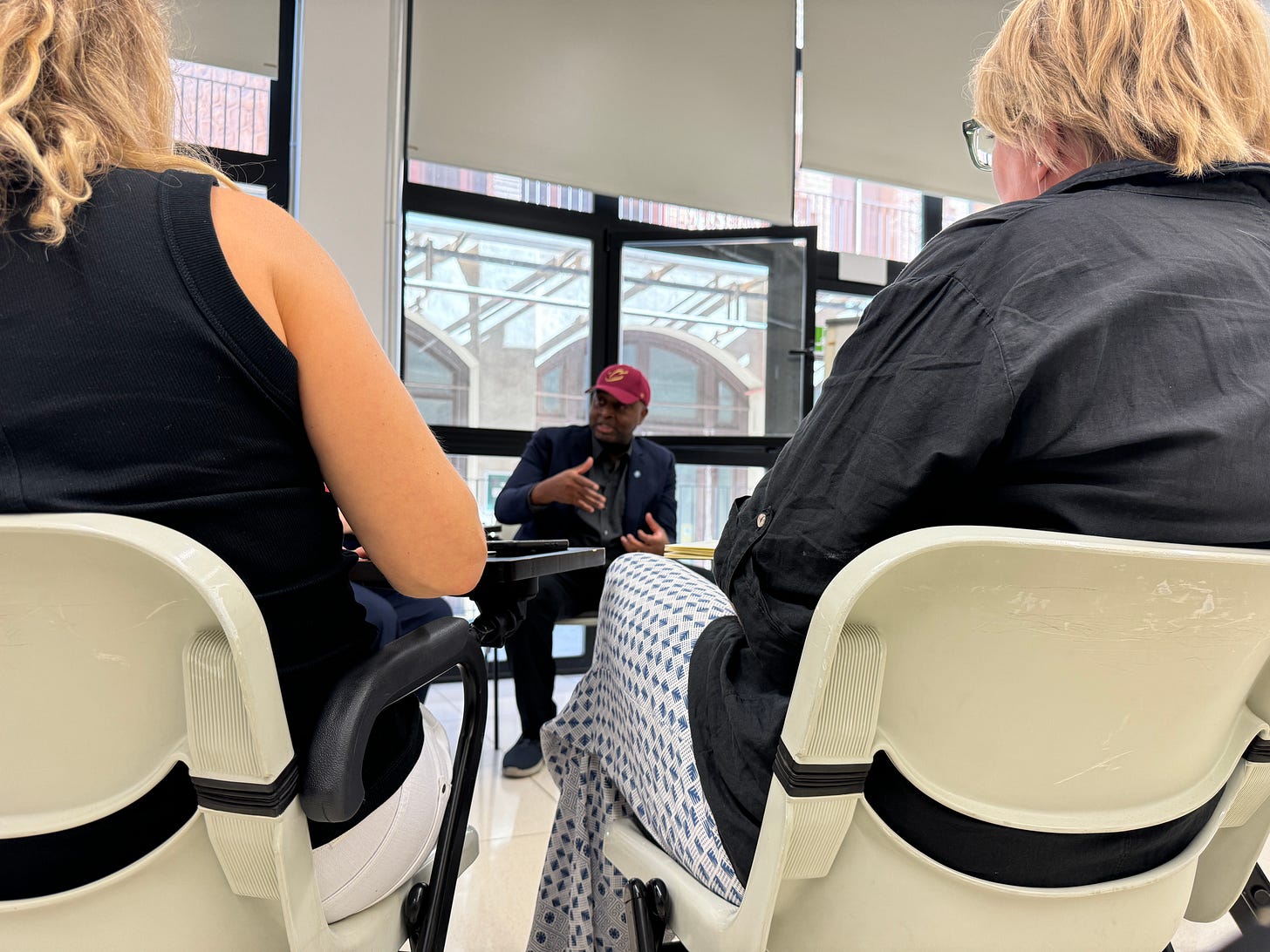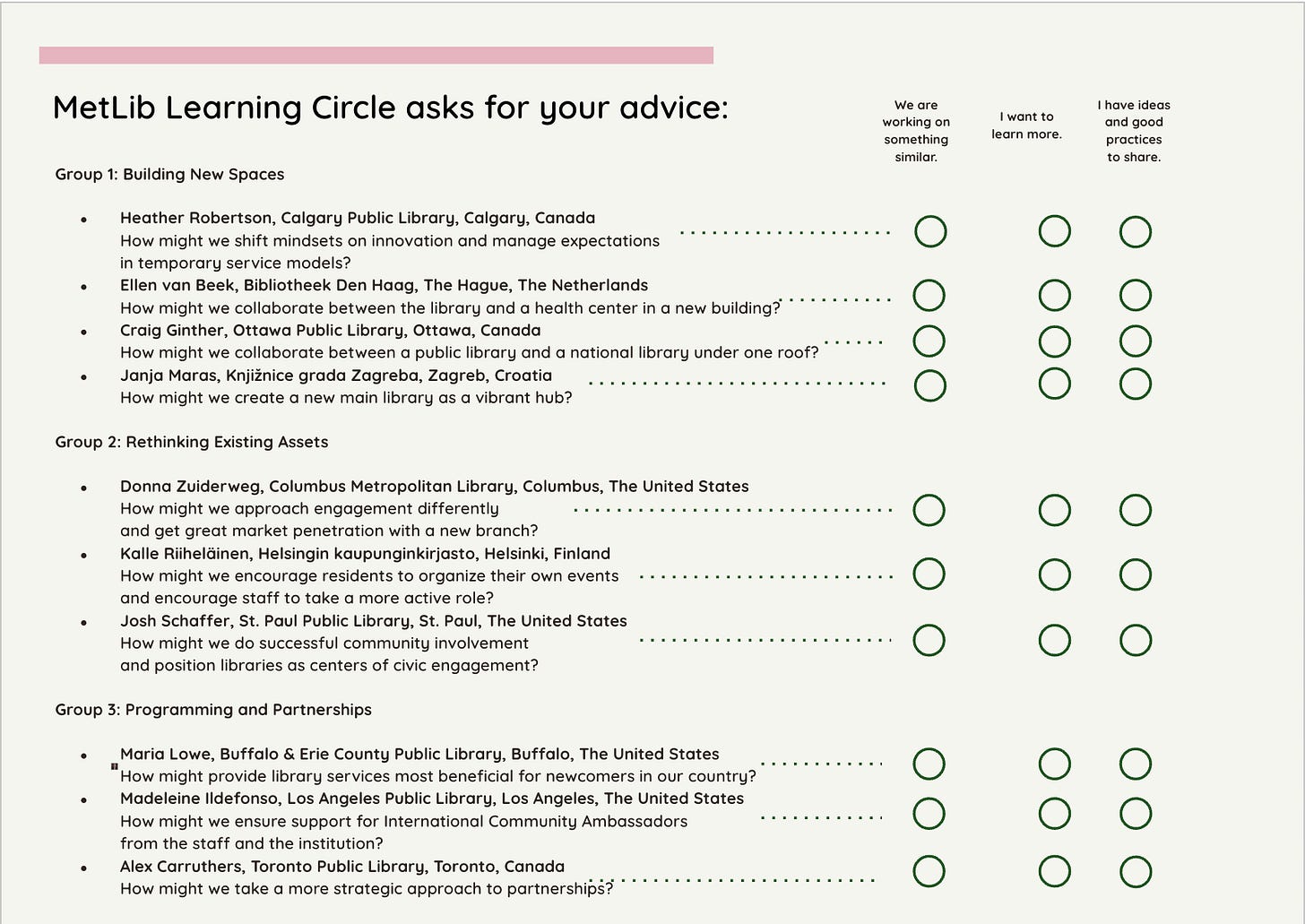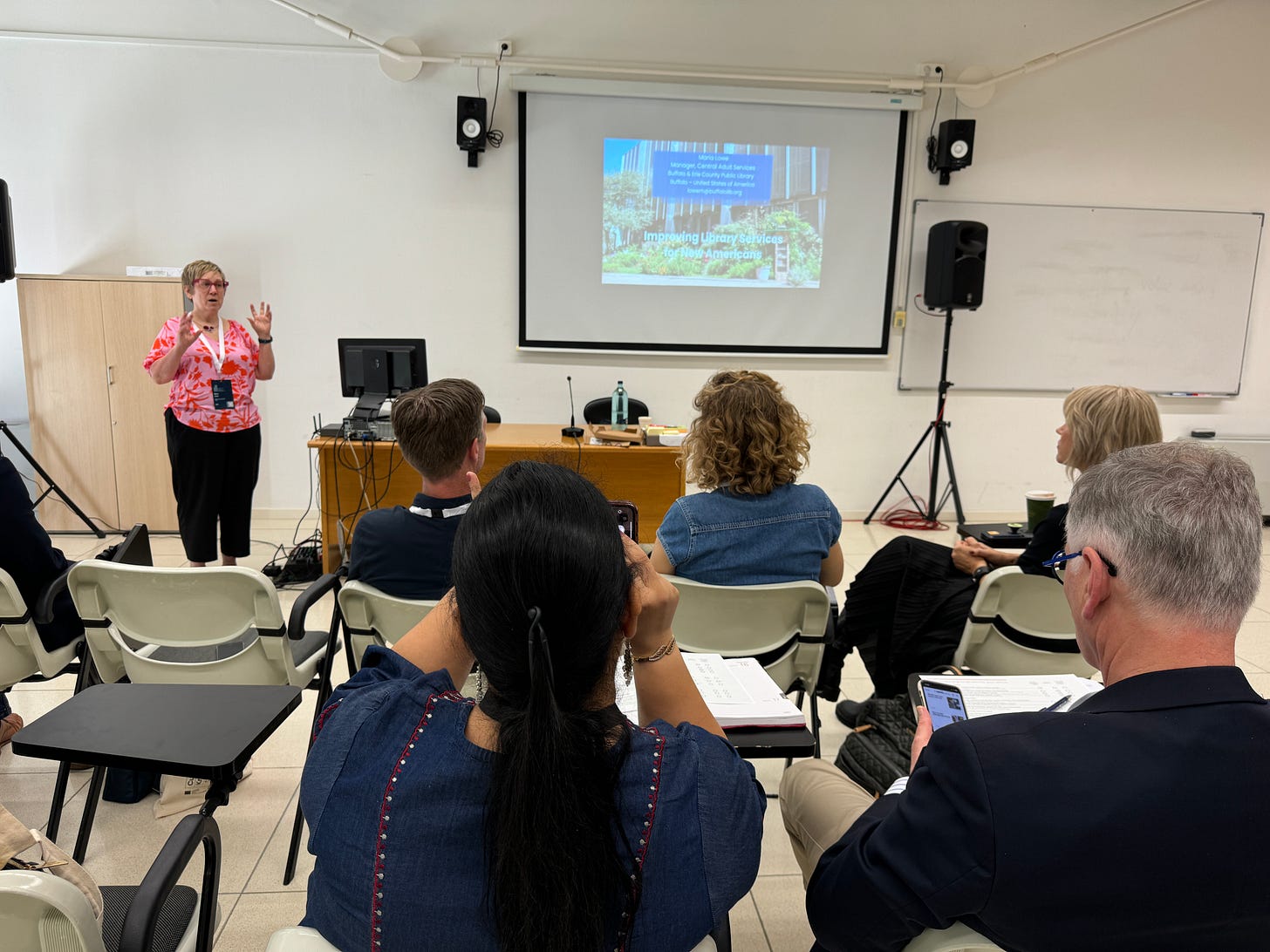Connecting Library Leaders
Applications are open to the third cohort of the Metropolitan Libraries Learning Circle. International exchange has helped the participants to ask for help and see their local context clearer.
In May 2022, I had just started my fellowship at Johns Hopkins University and was invited to the annual Metropolitan Libraries (MetLib) conference to talk about collaboration and friction. The Metropolitan Libraries conference is a convening of library leaders serving urban areas with more than 400,000 residents.
After my talk, we discussed with several of the organizers how we could keep in touch. I had decided to focus my research on libraries and parks and welcomed the opportunity to exchange ideas with practitioners. The organizers mentioned that often the international networking and growth opportunities focused on the current City Librarians and CEOs and they were keen on looking for ways to provide networks for the their direct reports and upcoming managers. The MetLib Standing Committee of the International Federation of Library Associations (IFLA) agreed to collaborate on this.
International exchange has been a big part of my entire career. It is often seen as slow, expensive and complicated. I think international exchange helps us make more meaningful work locally. I agreed to lead a new network of library leaders as a side hustle if we can keep it as a light lift.
Like most good ideas, this one is very simple:
MetLib Learning Circle is a 12-month talent development program initiated by the IFLA Metropolitan Libraries Section. This program is designed for library leaders from libraries serving urban areas with populations of more than 400,000. Each annual cohort has 15-20 leaders. Our 90-minute monthly online convenings have one guest speaker for 45 minutes. The second half is used for peer support for projects. The participants also attend and present at the annual MetLib Conference.
The two first cohorts have had 36 library leaders from 27 cities in 12 countries. Last week, we finished our second cohort and are currently recruiting the third one. (Applications due in end of March.)
Leading the network has been a lot of fun. These people are all pretty amazing, doing really hard work with dedication and optimism. The only costs for this have been the travels to the conferences, paid by each participant. Leading the network has probably taken me maximum 3-4 hours a month.
These figures from our second cohort’s evaluation speak for themselves:
Methods
We have identified several good practices in the first two years.
Read Before You Join: All the presentations for our monthly meetings are uploaded the previous week to a Google Drive and the expectation is that people read them before they join the call. This way the time together can be spent on dialogue.
Interculturality Requires Warm-Up: Finding ways to talk about our different realities with a positive vibe is an essential part of intercultural work. My go-to question - a sort of cliché - in the library world - has been: what are you reading right now? This has brought to surface our linguistic diversity and our diverse interests. It’s been a subtle way to demonstrate that we are not all the same. It’s been also completely OK to say that I am reading nothing right now as our kids are small or it is really hectic.
Give Space and Call Out: As a facilitator I have felt that it is my main responsibility to make sure the convenings feel supportive. I have started to ask people questions to get them to talk rather than waiting for hands to go up. This is also a way to tackle the unintentional bias towards native English speakers who can react faster. Sometimes it is also wise to give people a minute to write in the chat before opening the floor for discussion.
World Class Guests: Library people are some of the most generous people I know. We have had some of the leading library CEOs and City Librarians join us, to talk about something they are really passionate about. We have made it easy for them and asked the participants to watch and read materials in advance to get faster to dialogue. We have kept presentation maximum at 20 minutes. It’s been a way to show that these library world superstars are really just human.
Shorten and Practice: In our conference session in Barcelona, we tried something that worked well. We had 10 projects to be presented in the 90-minute session, which is a lot. I asked in advance everyone to squeeze their content into three minutes, including the problem, the current solutions and a clear ask for help. We met the day before and did a dry run where I, some of the library leaders present and their MetLib Learning Circle peers gave feedback on what can be cut out and what what needs more explanation. In the actual session, everyone was able to deliver their story in a way that was clear and did not feel rushed.
Ask for Help: There are a lot of international networks that incentivize boasting and bragging. We have intentionally leaned the other way: asking for help. For instance in our session in Barcelona, every speaker ended with what they need help in. And after each presentation, the participant’s of the workshop had 45 seconds in silence to tick one or more boxes:
- We are working on something similar.
- I want to learn more.
- I have good ideas and practices to share.
This gave participants agency, kept them energized and made it very easy to split into breakouts.
Break Bread: The two conferences, in Buenos Aires and Barcelona, have really bonded the participants. While you learn a lot about people in monthly Zoom sessions, online exchange is always fairly transactional. It’s breaking bread, seeing what others have for breakfast, experiencing awe together and sharing a taxi in a new city that builds the camaraderie. As we recognize that travel is a major investment for many and in many cities difficult to justify, we are working for ways to find some financial support especially for the participants from the Global South.
Feedback
I am a firm believer that the greatest advantage of international exchange is that you understand that you have more options than you think. This is one of the core convivencia skills: worldliness, as in seeing beyond your local confines. These testimonials from the participants are proof of that.
“Challenges that libraries face all over the world are similar but are managed in different ways.”
“The topics and projects presented throughout the sessions were incredibly relevant and often felt like the perfect answers to the questions and challenges I face in my daily work. The insights gained have provided me with practical solutions and new approaches that I can apply directly in my role.”
“The project I proposed has completely evolved based on feedback and information gathered at the MetLib conference.”
“We integrated the Learning Circle’s group feedback method into our internal strategy development.”
“We are bringing the concept of Convivencia into a lot of the planning and public service work we're doing, particularly as we partner with other city departments and service providers.”
“My exchange with foreign colleagues made me challenge my US-based thinking of safety and risk management.”
“Our discussions on staff engagement reminded me how often we end up putting the cart in front of the horse.”
“Based on the lessons from IFLA, I am advocating for us to take a stronger role in the UN Voluntary Local Review process.”
Join
The applications for the third cohort of the MetLib Learning Circle are due by 28 March. The third cohort is facilitated by me and Library Director Marie Oestergaard (Aarhus Public Libraries). The third cohort of the program runs from May 2025 to April 2026. The program consists of monthly online convenings of 90 minutes and a conference in Toronto, Canada in October 2025 where the participants have a chance to share their projects with and seek advice from colleagues from around the world.
If you are a library leader and this would fit your profile, I would encourage you to apply. If you know a library leader who would benefit from this, pass this forward.





